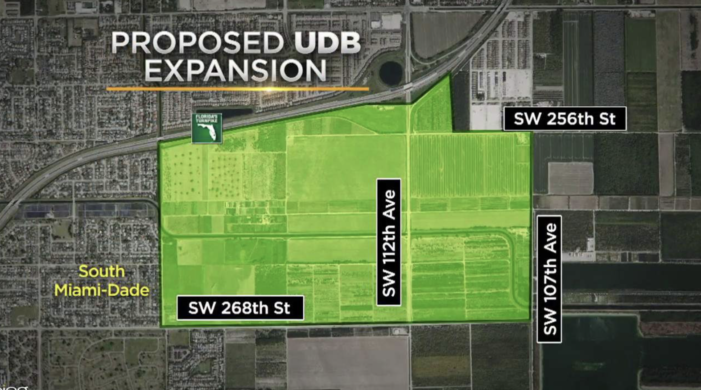They didn’t have the votes and they knew it. That’s the only reason why the would-be developers of an 800-acre industrial park on farmland beyond the Urban Development Boundary asked for a deferral Thursday, after several hours making their case before the Miami-Dade County Commission.
But it should have — woulda, coulda — died right there on the floor. The only reason it didn’t is because Commissioner Danielle Cohen Higgins — whose district the project would lie in — couldn’t read the room y se adelantó. If she had let someone make a motion to approve the application — which needed a super majority 9 of 13 votes — it would have failed and died right there. Never to come back again. At least not the same application.
Now the South Dade Logistics and Technology District, a mix of warehouses, shipping center, hotel and other commercial uses proposed by Aligned Real Estate Holdings and Coral Rock Development is coming back June 1. Basically, so the developers can convince one of the no vote commissioners to switch sides. The same developers who, combined, have contributed at least $400,000 to commissioner campaigns in the past 12 years, according to a quick, preliminary review by Ladra’s new best friend, Dani Rivera, a disability access activist who likes to crunch numbers. We will follow up with a more detailed accounting in coming days.
Read related: Miami-Dade Commission gives UDB expansion plan its first green light
Maybe since it’s an election year and/or Cohen Higgins is compensating for the bridge fiasco — or maybe just tiene que ser la protagonista — the appointed commissioner made a motion to deny the application, as recommended by the county’s well-paid, professional staff, every single environmental organization and every single local, state and federal watchdog agency — all the way up to the Department of the Interior.
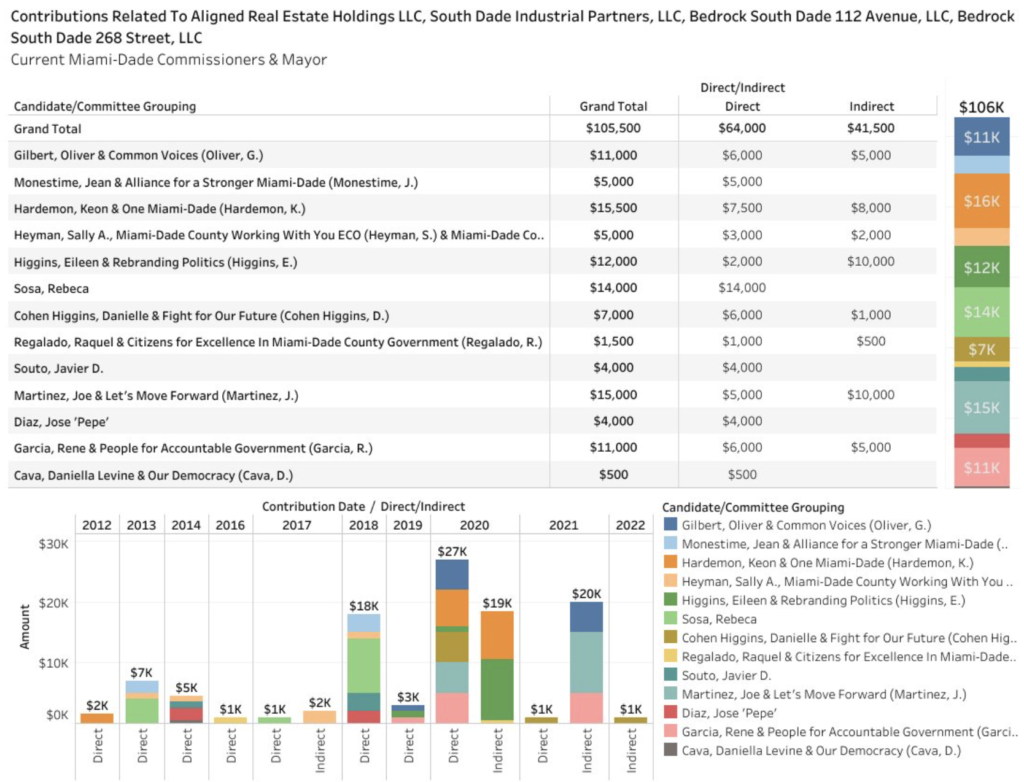
“Our environment is our economy,” Higgins Cohen said, adding that too many of the county’s problems are the “products of past poor behavior and misguided development.” Approving the change would be “undoing the progress we have all fought so hard to make.”
Her motion failed, however, when seven commissioners — mostly citing jobs and reverse commuter traffic — voted in favor of the change. Commissioner Sally Heyman — who voted against the application on first reading last Fall — was absent.
But that meant developers did not have the super majority needed to get the land use change on the comprehensive master plan. Any motion to approve the application would have fallen short without two of the five who voted against. Backing Cohen Higgins: Commissioners Eileen Higgins, Rene Garcia, Jean Monestime and Raquel Regalado.
Monestime had signaled at the meeting that the overwhelming opposition had swayed his vote, which was in favor of the project last year. Garcia, who also voted in favor at first reading, was the big surprise, staying quiet during discussion. He told Ladra after the meeting that he had only voted in favor for transmittal to the state to see what the state agencies said. And the application — which is the largest came back with recommendation for denials from everyone.
“There were still too many unanswered questions,” Garcia said. “I’m not hard against moving the UDB, but we still don’t have the means to preserve agricultural land as we should. We need a comprehensive approach. It can’t be application by application.”
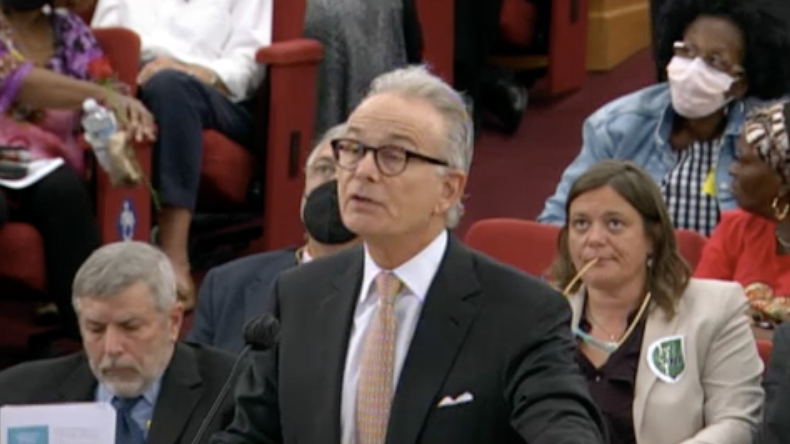
Attorney lobbyist Jeffrey Bercow (above), who can count better than DCH, interrupted the discussion — even though he had ended his presentation — and asked for a deferral to work out some of the issues raised. “They’ve been worked out on the fly over the last 24 hours,” he said.
Wait. He’s not a commissioner. He can’t make a motion.
But that didn’t matter. Bercow has friendly commissioners on the dais — Kionne McGhee, Rebeca Sosa and Oliver Gilbert sounded like they were partners at his firm (more on that later) — who would make the motion for him. They were led and encouraged by Chairman Jose “Pepe” Diaz.
Read related: Kendall Parkway to nowhere is an intentional slippery slope for UDB
“In the process of us doing this, we’ve always respected an applicant saying ‘We haven’t met with them. Let us meet with them,'” Diaz said, supporting the deferral. “If there is a difference in something that could be improved on.”
Bercow had already made presentation with his paid experts and provided the commission with a three-page list of names of people who supposedly supported the change in land use, which would be followed by a zoning change request, but chose not to speak. Many people came wearing pro jobs t-shirts likely provided to them by the developers who may have “invested” in some grass roots support. It happens more often than people think.
He made his case after dozens (hundreds?) of people spoke against the change, including Leonard Abess, who owns 160 acres inside the proposed industrial park — that’s 20% — and wants no part of it. He called the developers “speculators.” Most people believe that to be true since the land is expected to skyrocket in value after the change is approved.
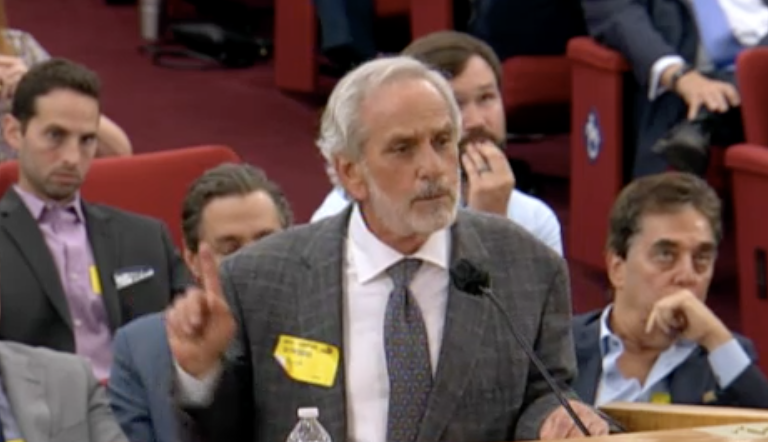
“This is one of the biggest frauds in the community. A con game,” Abess (above) said, adding that he declined to sell his land, which the developers call Phase 3 and sits in the middle of the two other parcels to be developed first. He could make $100 million if the land use change was approved. And he still urged against it and advocated for farming, the second largest industry in Miami-Dade after tourism. During the COVID19 crisis, it was No. 1.
The executive director of the Dade County Farm Bureau also said that maintaining agricultural land was “crucial” and that there was still plenty of land within the UDB to build what developers want.
That was one of the reasons that the staff — the professionals paid with our tax dollars to independently review these applications without the pressure of campaign contributions — recommended denial of the change. They also found that the promise of 12,000 or 13,000 jobs was inflated. It was more like 1,200 or 1,300. Someone added an extra zero.
And that raises doubts about everything they present, doesn’t it?
The application was also against almost every single policy and priority the commission has set, said Assistant Planning Director Jerry Bell. The application, if approved, “makes it harder to prioritize infield development…SMART plan corridors, urban centers. Iit really kind of diminishes our ability to accomplish those by just flooding the market.”
Regalado reminded commissioners that part of the reason they approved the paving of a natural preserve on the abandoned Calusa Golf Course is because the UDB line cannot be moved.
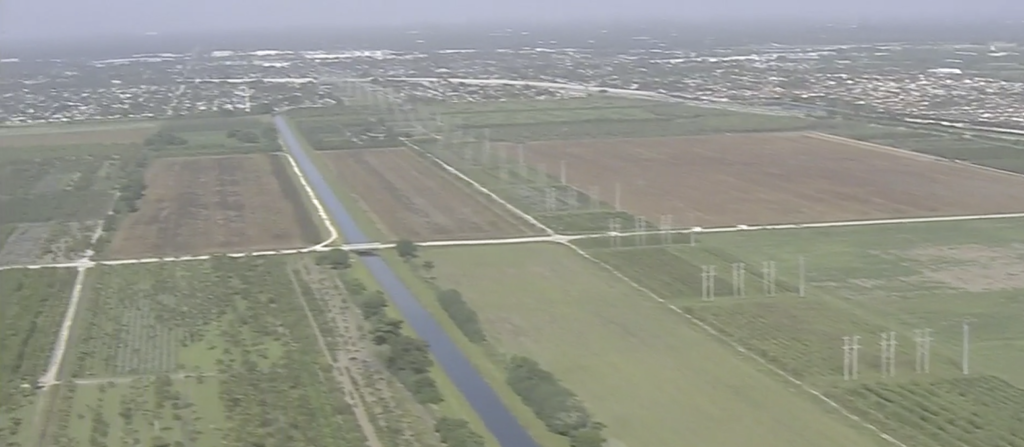
“I do not think we should pit the environment vs jobs,” Regalado said, adding that she is not against moving the UDB for the right project. She also said that there was land within the UDB that also merited protection.
Read related: Miami-Dade Commission votes to kill Calusa preserve for Kendall developer
Developers also had no real set plans for the project, no named tenant, no lease details and the infrastructure improvements they would fund were uncertain because the majority of them were tied to the Phase 3 part of the development — on land they don’t even have control of — with no guarantee that Phase 3 would ever even happen.
Isn’t that the same as no infrastructure improvements?
In short, the application wasn’t ready. Far from it, in fact, and probably why everyone and their brother recommended denial. Ladra suspects that those infrastructure uncertainties and the promised $250 million “community benefit” will be better defined when it comes back next month. Otherwise, why ask for a deferral?
Diaz said, however, that because there were hours of testimony provided during Thursday’s meeting, the public hearing was closed and there would be no public comments allowed on June 1. He loves to silence the public; does it every chance he gets.
But won’t the project be different when it comes back? Isn’t that the whole reason for the deferral, so the developer can make some changes (or more contributions) to make it more palatable?
Bercow is getting a second bite at the apple but the opposition can’t?
Stay tuned. Ladra is going to seek a second opinion.

